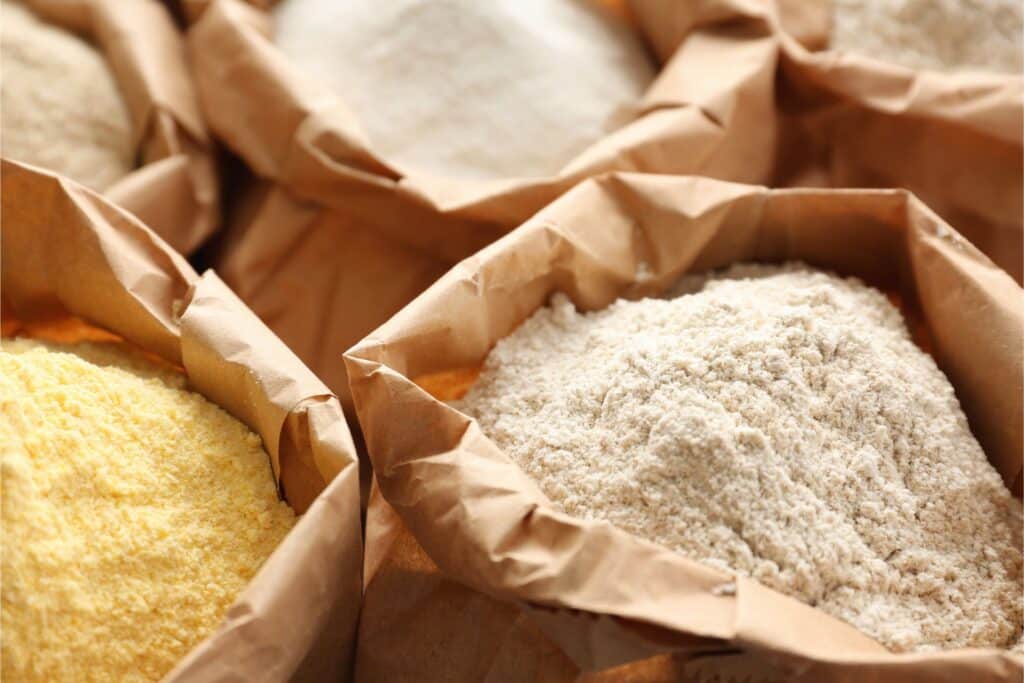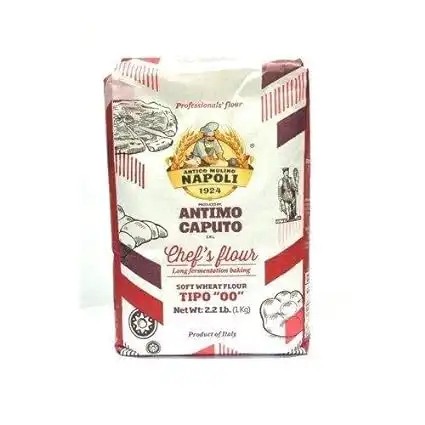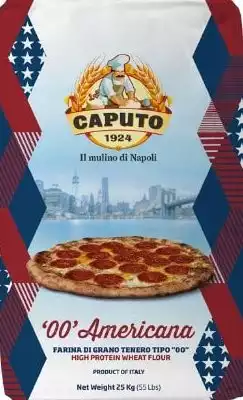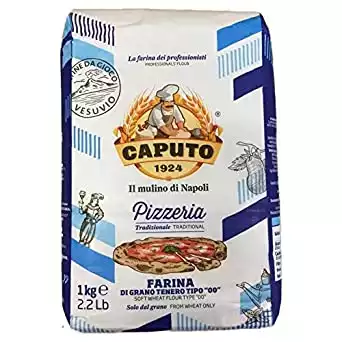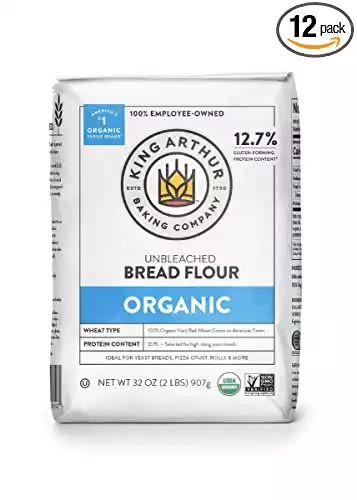Pizza. It’s more than just food—it’s an experience, a global love language uniting the taste buds of millions around the world. And the foundation of this gastronomic delight? The dough, more specifically, the flour that goes into it.
Here at Homemade Pizza Pro, we’ve dedicated countless hours to the science and art of pizza making. We believe that the quest for the perfect pizza starts with the right flour, and we’ve spent years testing numerous brands and varieties to find just that. From all-purpose to bread flour, from imported Italian to local artisanal types, we’ve kneaded, rolled, and tasted our way through them all.
In our extensive journey, we’ve gained invaluable insights into the complex role of flour in pizza making. It’s not just about creating a dough—it’s about understanding how different types of flour can significantly influence your pizza’s texture, taste, and crust char.
So, which is the best pizza flour that we trust for our pizzas?
We are going to show you why Caputo Chef’s Flour is the best pizza flour.
Stay with us as we take you through our journey, and the factors we’ve considered, and ultimately reveal the brand we use. Trust us; this information might just be the secret ingredient you need to elevate your pizza game.
So, keep reading to learn from our experiences and find out what makes our favorite flour the best for your pizza-making adventures!
Let’s get started!
Here’s What You Will Find:
Key Takeaways
Best Pizza Flour – Caputo Cuoco
Versatile Baking: Caputo Cuoco, or Caputo Chef’s Flour, is a multi-purpose flour ideal for crafting both Neapolitan and Classic style pizzas, as well as a wide variety of other baked goods.
Superior Handling: Thanks to its soft starch and strong, elastic gluten, Caputo Chef’s Flour creates a dough that absorbs moisture efficiently, making it easy to work with and delivering a superior homemade pizza experience.
Long Fermentation Friendly: This flour is particularly suited for dough requiring a long fermentation period, enabling it to rise well and develop a deep, nuanced flavor while maintaining an excellent crust texture.
Convenience and Accessibility: With a shelf life of 12 months and ready availability both online and in specialty stores, Caputo Chef’s Flour is a convenient and reliable choice for all your pizza-making and baking needs.
Our Extensive Testing Process and Criteria
Choosing the right pizza flour involves much more than simply picking a bag off the shelf. In our journey toward finding the best pizza flour, we established a rigorous testing process and a comprehensive set of criteria to fairly and thoroughly assess each brand and variety.
Here’s what we look for in pizza flour:
Protein content
The protein level in flour determines the amount of gluten that can be formed, which ultimately affects the texture of the pizza crust. We look for a flour that can provide enough protein to create a strong gluten network, which gives the dough its structure, elasticity, and ability to rise well in the oven.
But too much protein can lead to a tough crust, so striking the right balance is essential.
Fineness of the grind
A finely milled flour tends to absorb water more quickly and yields a smoother, more elastic dough, while a coarser grind can lead to a dough with a more rustic texture.
Dough handling
How easy is it to shape the dough? Does it tear or does it stretch beautifully? The best pizza flour should make the dough-handling process seamless, enabling both beginners and experienced pizza makers to shape their pizzas effortlessly.
Taste and texture
The final and arguably the most important criterion is, of course, the taste and texture of the cooked pizza crust. We look for flour that can produce a crust that’s light and airy with the right amount of chew. The crust should also have a slightly crisp exterior, a delicate balance that’s characteristic of an excellent pizza.
We’ve used these criteria to test countless flour brands and varieties, going through numerous iterations to understand how each type of flour behaves and contributes to the final product. This rigorous process helped us determine the most suitable flour for crafting the perfect pizza.
We will dive deeper into our experiences with different flours in the next section.
Types of Pizza Flours We’ve Tested
Our exploration took us through a wide array of flour types, each with its unique characteristics. We started with the most commonly available types: all-purpose flour and bread flour. Both versatile in their uses, they demonstrated different outcomes, mainly due to their varying protein content.
Next, we moved on to whole wheat flour, which brought a distinct, slightly nutty flavor and a denser texture to our pizzas. For those who favor a hearty and rustic pizza crust, this flour was a key contender.
Experimenting further, we explored specialty pizza flours like ’00’ flour, a fine Italian flour known for creating a remarkably smooth and elastic pizza dough. Also, high-gluten flour was tested for its superior protein content, which led to a pleasantly chewy texture in our pizzas.
Lastly, we ventured into the realm of artisanal flours, which included locally milled selections and several organic varieties. These specialty flours offered unique flavor profiles and contributed to creating artisan-style pizzas with a touch of gourmet appeal.
Our Experience with Different Brands and the Impact Each Had on the Final Pizza Result
Each brand and type of flour we tested brought something unique to our pizza-making process. All-purpose flour, while not the top contender, offered a reliable and accessible option for a decent pizza crust. Bread flour, with its higher protein content, gave us a crust with a pleasing chew, while whole wheat flour added a depth of flavor and hearty texture.
The ’00’ flour from various brands provided fascinating results. Some yielded a crust that was delightfully crispy yet light, while others, though creating a beautiful dough, didn’t quite achieve the same level of crispiness.
High-gluten flours were a revelation in creating a chewy crust with great structural integrity. However, the extra chewiness wasn’t always what we were seeking in a perfect pizza crust.
The artisanal flours varied significantly in their results, largely due to differences in the wheat grain types and milling processes. Some created pizzas with an intriguing blend of flavors, while others offered a great texture but lacked a little in flavor.
The journey through different brands and flour types has been an enlightening exploration, teaching us how each type and brand of flour can significantly influence the final pizza’s texture, flavor, and overall quality. The experiences gained and the lessons learned from these trials have helped us immensely in our quest to find the best pizza flour.
Factors to Consider when Choosing Pizza Flour
Flour is the essential ingredient for a pizza baker — you just can’t make pizza without flour.
It’s the foundation of the pizza-making process and the base of your recipes. Remember that flour is always 100% when using the baker’s percentage method.
Choosing the right pizza flour is a science in its own right, a subtle art that requires understanding a few key factors.
Pizza Flour comes in different classifications. We like to think of it as a family name.
Since they all belong to the same family, they will have the same last name “Flour,” but they will have different first names to distinguish them from.
Like, “Joe and Jane Smith,” and “All-purpose Flour and Bread Flour.” People even shorten their names, like a nickname, AP for All-Purpose Flour.
Although they are in the same family, they all have different characteristics that make them unique.
Here, we’ll delve into some of the essential criteria that can significantly impact the quality of your pizza crust.
Quality
Most pizza flour companies bleach their flour with chemicals like chlorine dioxide and benzoyl peroxide to give it an artificially white appearance.
Thus, the name, Bleached and Unbleached Flour. When choosing flour, look for one that contains no bleach, no bromate, and no artificial preservatives of any kind. Check our article on bleach flour for more info.
Role of Protein Content in Flour
Protein content in flour is not just a nutritional value; it’s an essential factor that defines the texture and structure of your pizza crust. When water is added to flour, two proteins, glutenin, and gliadin, combine to form gluten.
This gluten network is responsible for the elasticity and extensibility of your dough, affecting how well it rises and its chewiness post-baking. Every type of flour is milled to have a specific protein content. This protein content is also referred to as the “Gluten Content“.
Gluten content is expressed in a percentage (%) of the total flour content — the higher the protein, the “stronger” the flour.
Some pizza flour brands allow wide fluctuations in their protein content. Some don’t even say their protein content. So, every time you use it, you’ll get different results.
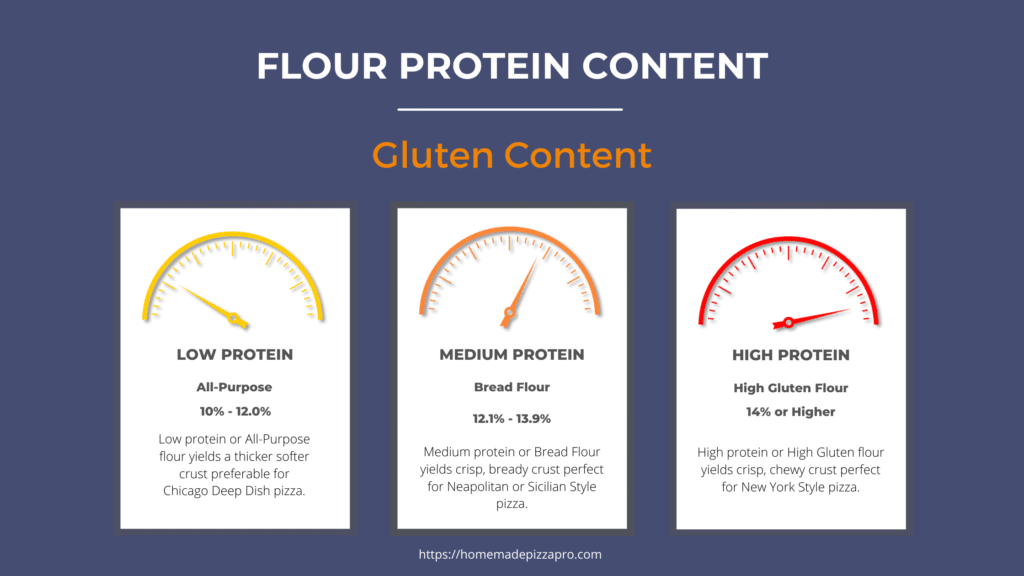
Baking with the best pizza flour that’s consistent in protein will give you the best, most consistent results when cooking pizza at home.
Lower protein flours like pastry flour or cake flour typically result in a tender and crumbly crust, while higher protein flours like bread flour or high-gluten flour yield a more robust and chewy crust. For pizza, we’re usually looking for a balance—a crust that’s light and airy, yet with a pleasant chew, making flours with medium-high protein content often a good choice.
When choosing a brand of pizza flour, choose a brand that adheres strictly to that number. A brand that you can trust, that what you get in the bag of flour is what you see on the label.
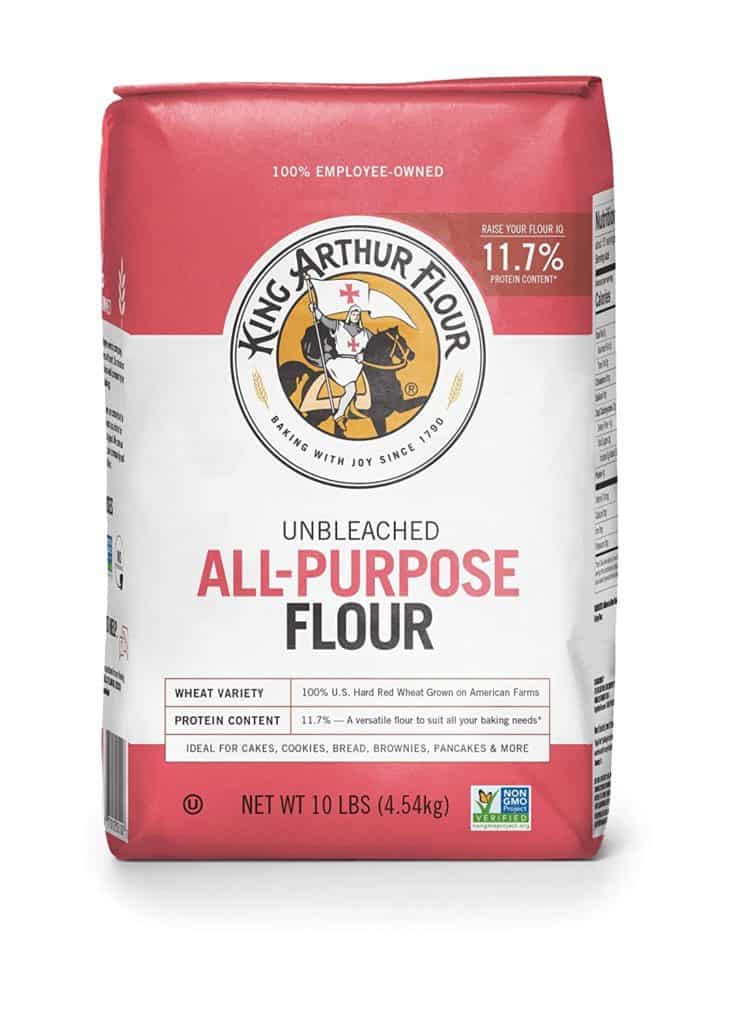
King Arthur Flour
King Arthur Flours adheres to the most strict regulations in the industry. They claim that what it says on the label is exactly what you get.
Find out more about their King Arthur flour products here.
It’s essential to use the best pizza flour with the proper protein content for your recipe. You can pick and choose almost any ingredient and carefully craft the perfect pizza to suit your tastes.
The hardest part is choosing the right dough. Some dough is too springy, while others are too tough and flaky.
The gluten (protein) content of the flour has the biggest impact on how your pizzas will turn out.
Depending on whether you want New York-Style pizza or a Chicago deep dish, you may need more or less gluten.
Importance of the Milling Process
The milling process—the way the grain is ground into flour—can have a significant impact on your dough’s behavior. Finely milled flours, like Italian ’00’ flour, tend to absorb water more quickly, resulting in a smooth, elastic dough that’s easy to handle. On the other hand, coarser flours can create a more rustic-textured dough.
Furthermore, some flours undergo a bleaching process, which can affect the flour’s performance. Bleached flour, due to the maturing agents added, can develop gluten more quickly but may lack some depth of flavor compared to unbleached flour.
Impact of Gluten Content on Pizza Dough’s Elasticity
While we’ve touched on gluten when discussing protein content, it’s crucial to emphasize its role in pizza dough elasticity. The gluten network formed in your dough is what gives it the ability to stretch without tearing, an essential characteristic when shaping your pizza.
Flours with higher gluten potential, such as bread flour or high-gluten flour, provide good elasticity. However, too much gluten can lead to an overly elastic dough that shrinks back during shaping or an end product that’s excessively chewy. Achieving a balance with just the right gluten formation often leads to the best results: a pizza crust that’s easy to shape, light and airy, with a satisfying chew.
Understanding these factors is key in choosing the right pizza flour, one that suits your preferred pizza style and pizza baking method. In our years-long journey, keeping these factors in mind helped us land on a flour that consistently delivers excellent results, and we’re excited to share that with you! If you want to learn more about gluten, check out our article Demystifying Gluten in Pizza.
Revealing the Best Pizza Flour We Use
After years of experimenting and countless pizzas later, we’re thrilled to reveal our top choice for pizza flour: Caputo Cuoco for homemade pizzas cooked in a conventional oven, and Caputo Pizzeria for pizzas cooked in an outdoor pizza oven.
Overview of Best Pizza Flours
Caputo Chef’s (Cuoco) is the best pizza flour for home ovens.
Caputo Americana is the best pizza flour for NY-Style pizza.
King Arthur Bread Flour is the best bread flour for pizza.
King Arthur All-Purpose Flour is the best all-purpose flour for pizza.
Caputo Pizzeria Flour is the best pizza flour for outdoor pizza ovens.
Our Top Choice for Pizza Flour
Caputo Cuoco, also known as Caputo Chef’s Flour, is our go-to choice for pizza-making at home using a conventional oven. This flour, a staple in many professional pizzaiolo’s kitchens, has consistently demonstrated its superior quality and performance in our rigorous tests.
For those fortunate to have an outdoor pizza oven, we recommend Caputo Pizzeria. This flour is designed to withstand the high baking temperatures of a traditional wood-fired oven, resulting in tasty pizza crusts with the perfect balance of crunch, chew, and airy pockets.
Why They Stand Out from Other Brands
Caputo flour stood out from the pack for a variety of reasons. Their protein content hits that sweet spot—enough to develop a strong gluten network for an airy, light crust but not so much that the crust becomes tough or overly chewy. It offers the right balance, resulting in a crust that’s tender yet chewy, and crisp on the outside while remaining soft and airy on the inside.
Additionally, Caputo flours are finely milled, which aids in water absorption and results in a smooth, supple dough that’s a pleasure to handle. The dough’s elasticity makes it easy to stretch and shape without tearing, a characteristic that both beginners and experienced pizza makers will appreciate.
Specific Attributes such as Texture, Taste, and How It Handles During Pizza Making
In terms of texture, Caputo Flours consistently produce a flavorful pizza crust with a delightful contrast—crisp on the outside with a light, airy interior. The taste is subtly wheaty, providing a perfect canvas for your chosen toppings without overwhelming them.
Handling Caputo dough is a joy. The finely milled flour makes for a supple, elastic dough that stretches beautifully, allowing you to achieve your desired pizza shape with ease. The dough responds well to resting and exhibits excellent fermentation characteristics, which contributes to its wonderful flavor and texture.
Enhancing Caputo Flour with a small amount of diastatic malt powder can elevate your pizza crust to new heights, as the diastatic malt powder aids in dough fermentation and caramelization, resulting in a crust that’s perfectly leavened, flavorful, and beautifully browned.
In our pizza-making journey, the switch to Caputo Flours was a game-changer, setting a new standard for our pizzas. Whether you’re a pizza-making novice or a seasoned pro, we believe Caputo Flours can elevate your pizza game too, offering an authentic pizzeria experience right at home.
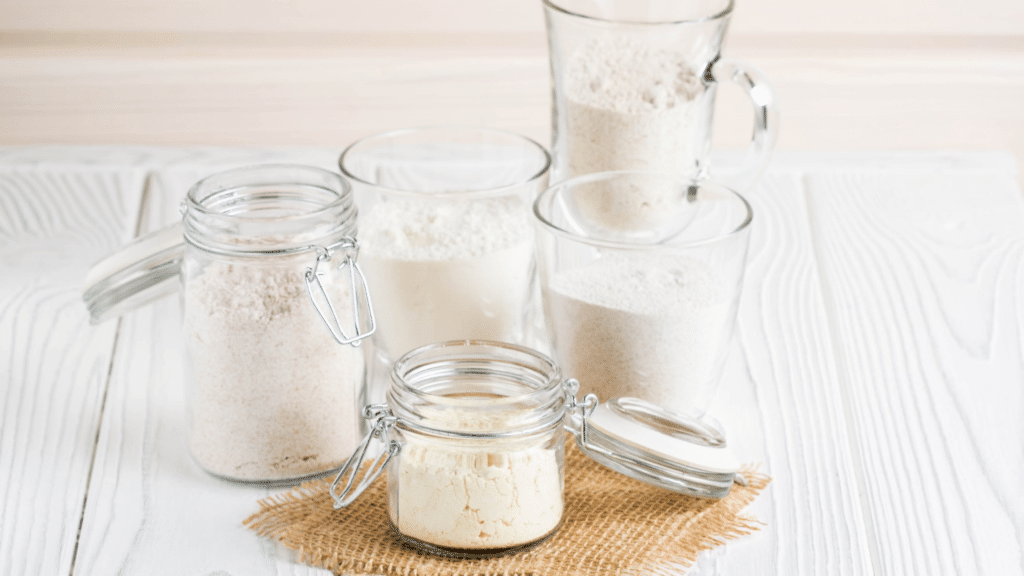
Matching the Pizza Style to Flour and to the Oven
Different pizza styles require different types of flour. But another factor that you need to consider is your oven. Are you a lucky owner of an outdoor wood-fired pizza oven or an Ooni pizza oven?
Or, are you the average cook that is trying to step up the game?
Either way, you need to know your oven and understand how it works. Different ovens reach different temperatures, and the temperature will also be a factor when considering which flour to use.
The chart below will give you an idea of the best pizza flour and the best temperatures for each of the basic pizza styles.
Keep in mind that if you bake your pizza at a lower baking temperature than suggested, it will take a little longer to cook.
These are only suggested values for best results.
It is up to you to decide what works better for you and your taste.
Match Your Pizza Style To Your Flour
Neapolitan | New York Style | Sicilian | Chicago Deep Dish | |
|---|---|---|---|---|
| Flour Protein Content | Medium Protein Content | High Protein Content | Medium Protein Content | Low Protein |
| Oven Temperature | 700°F – 950°F (Best) | 600°F to 700°F (Best) | 475°F to 500°F (Best) | 475°F to 500°F (Best) |
Note the average kitchen oven only reaches up to 500°F, while an outdoor pizza oven can reach temperatures of 900°F. Hoever, you still can bake any of the pizzas that are best at higher temperatures, they will only take longer.
With that in mind, here is a closer look at the best pizza flour for making homemade pizza.
Pro Tip
Using a digital thermometer find the actual baking temperature of your oven. Use a timer to find the exact time your pizza bakes at that temperature. By doing this, you will get consistent results.
Best Flour for Pizza
After experimenting with different kinds of pizza flour we came to the conclusion that Caputo Flour is the best pizza flour to make pizza.
Note that we are not related in any way, or sponsored by any of these brands. Our opinion is strictly ours based on our experience.
Caputo Flour “Typo 00”
Caputo Tipo 00 stands out as the top choice. The “00” in the name of the flour refers to its texture.
Tipo 00 flour is finely ground wheat flour, which keeps it from rising too much during proofing.
The double zero is part of a grading system that indicates how finely ground the flour is. Other grades include 0, 1, and 2, with 00 being the finest.
Caputo Flour produces different kinds of Type 00 flour.
For pizza purposes, they produce specific flours depending on the different pizza styles. The three that are readily available in the US are Pizzeria, Chef’s, and Americana.
The difference between these flours is their protein content, fermentation process, and elasticity.
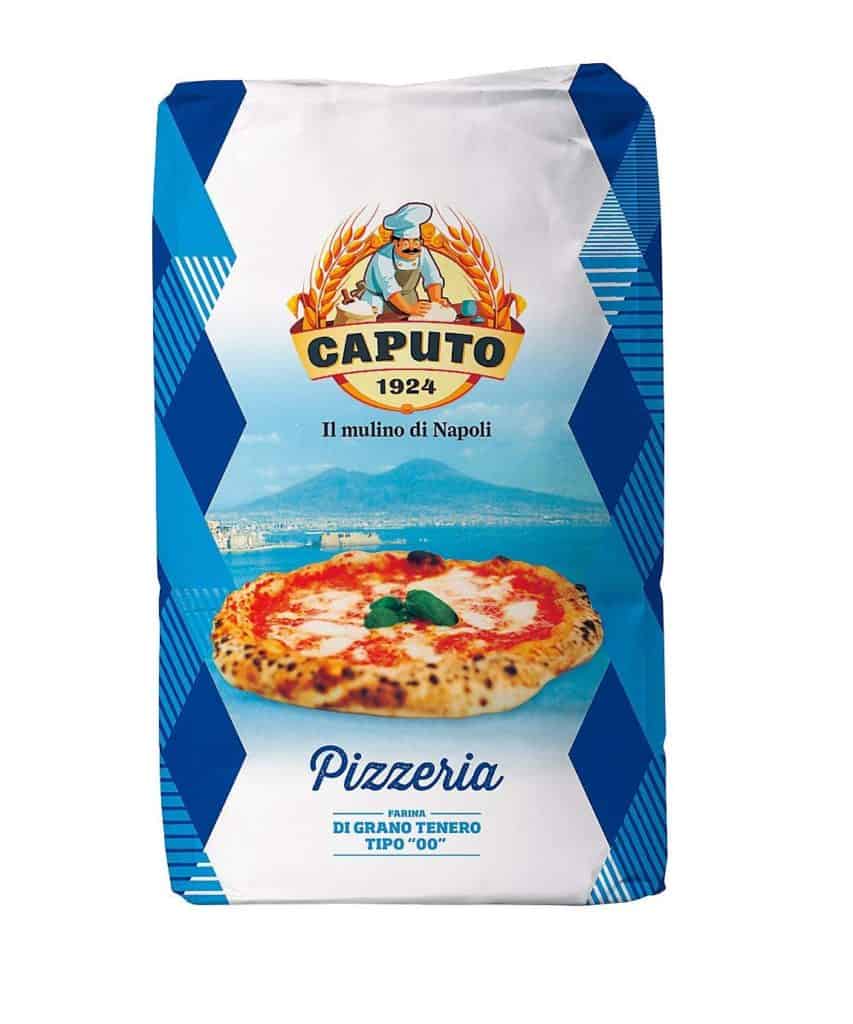
Pizzeria Flour
Caputo Pizzeria Flour is the best pizza flour for outdoor pizza ovens.
Pizzeria flour is a high-quality pizza flour, the gluten content is 12.5%. Ideal for classic Neapolitan pizza dough made in high-heat wood-fired, gas, or electric ovens in high temperatures over 700°F degrees. Pizzeria flour is blended with Farina Manitoba flour to strengthen the dough. Manitoba flours are highly enriched flours with a “W Index” higher than 350 that are subjected to long leavening and used to reinforce weaker flours.
Pizzeria flour is used by the true Neapolitan pizza association.
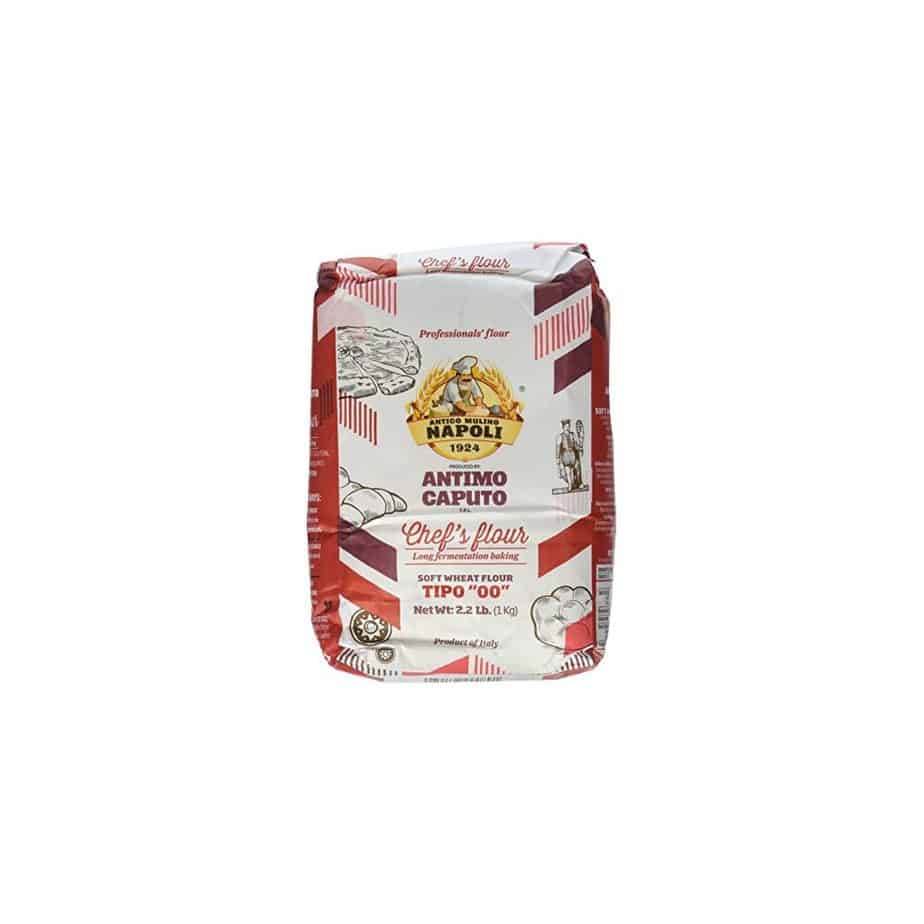
Chef’s Flour
Caputo Chef’s Flour (Cuoco) is the best flour for home ovens. The gluten content is 13%. This medium-gluten wheat flour is often used for making delicious homemade pizza. Chef’s flour is great for home ovens and temperatures up to 500°F degrees. Check our article Chef’s vs Pizzeria to learn more about their differences.
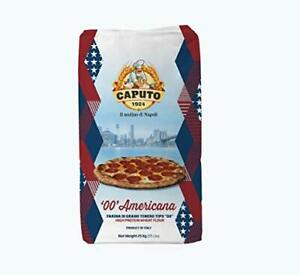
Americana
The gluten content is 14.25%. Milled specifically for use at temperatures between 500-600°F. Is ideal for NY Style pizza. It produces a flavorful crust with optimal hydration
Compared to other flours, Caputo creates a silky dough that maintains its chewiness. When baked at high temperatures, the crust is chewy but not too rubbery.
The only problem you may encounter is trying to find the best pizza flour and the price you need to pay. Caputo does come with a significant price tag compared to other common brands.
An alternative to Caputo Flour, which also falls in the “Best Flour” category, is King Arthur’s Flours, which is a domestic version of the famous flour brand.
King Arthur Flours
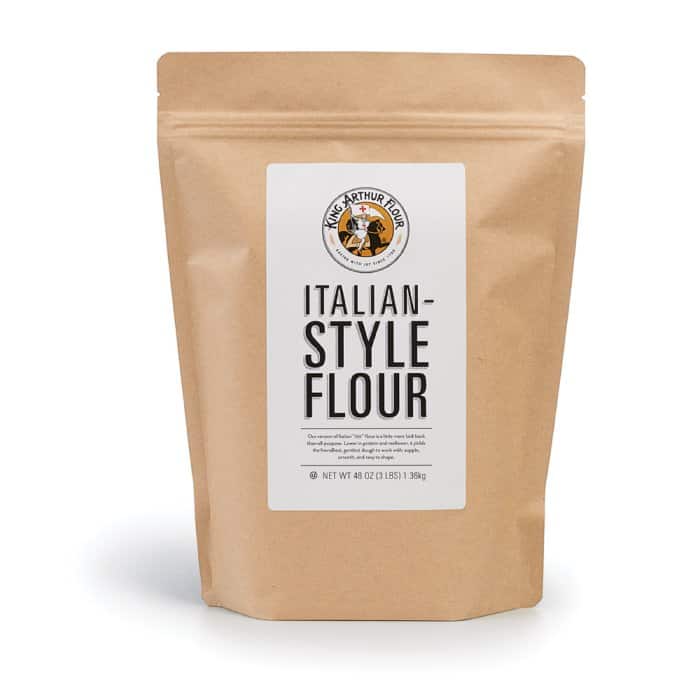
Italian Style Flour
This is their finest Italian flour version of the “00” flour. Lower in protein-containing only 8.5% It yields a smooth, and easy-to-shape dough. Resulting in a crisp crust. This flour is the perfect substitute for pasta flour or semolina flour.
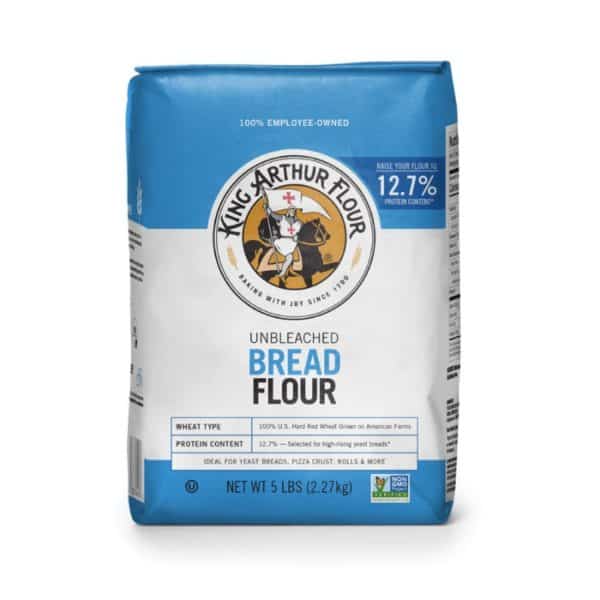
Bread Flour
King Arthur Bread Flour is the best bread flour for pizza.
The gluten content is 12.7%. This medium-gluten flour is often used for baking Neapolitan pizza, It will give a nice bready, chewy crust.
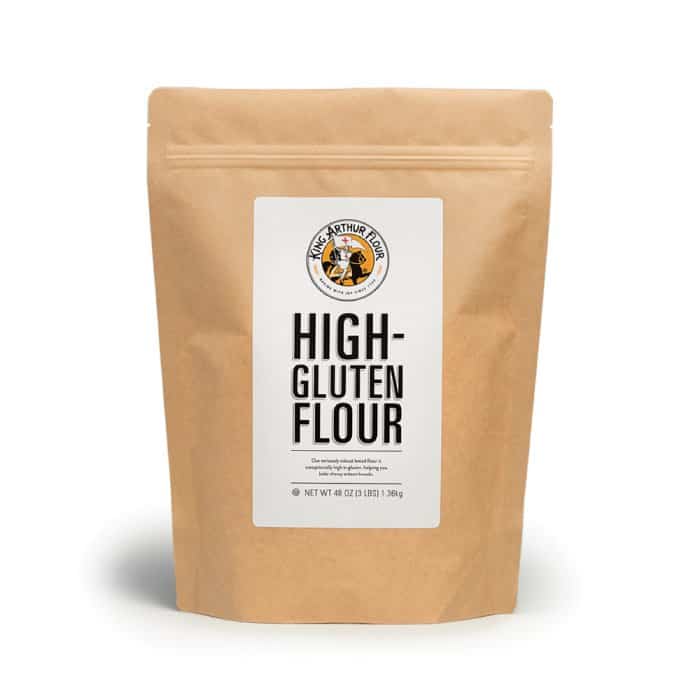
High Gluten Flour
The gluten content is 14.2%. This unbleached flour is milled from the finest hard red spring wheat to give an extra chew to your crust and a higher rise.
Of the three Arthur King Flours that are suitable for homemade pizza dough, we find the Bread Flour is the most well-rounded. It’s the happy medium, that can be used for any kind of pizza.

Is Bread Flour Good for Pizza?
Texture and Structure
When using bread flour, you get a dough that is thick, soft, and fluffy. It is also easier to work with compared to all-purpose flour.
You get slightly more gluten compared to all-purpose flour; this helps give the dough more elasticity. It is less likely to tear as you stretch it out, allowing you to form it into the desired shape quickly.
Unlike all-purpose flour, bread flour has enough gluten to maintain a softer consistency during baking; this also allows air bubbles to form in the crust.
The higher gluten content makes the dough a little chewier and more textured. As with the Caputo Tipo 00 flour, it doesn’t taste too rubbery. It still contains less gluten compared to high-protein flour.
Most Common Bread Flours Used For Pizza
| Flour | Protein Content | Bleached | Enriched |
|---|---|---|---|
Gold Medal Better for Bread | 12% | No | Yes |
King Arthur Bread Flour | 12.7% | No | Yes |
Pillsbury Best Bread Flour | 12.9% | No | Yes |
White Lily Bread Flour | 11.7% | No | Yes |
Due to the higher gluten content compared to all-purpose flour, the dough can quickly spring back into shape; this can make it a little more challenging to stretch flat on a pan.
If the dough keeps bouncing back to shape after stretching it out, try stretching it an inch or more than the desired size.
When you flatten the dough thin enough, the crust should be crispy on the outside and chewy on the inside.
King Arthur Bread Flour is the best bread flour for pizza dough, it gave us the best results of all the bread flours we’ve tested.
For Sicilian pizza, it’s just the best.

King Arthur Bread Flour
This Bread Flour has a protein content of 12.7% and is unbleached and unbromated. Is an essential ingredient for every baker, and we find that it works the best for bread. However, it also performs very well for Sicilian pizza.
Bread flour requires a little more water than most other flours to produce doughs of equivalent viscosity. Because of its high protein content, some people may find bread flour doughs a little difficult to stretch — it has a tendency to bounce back. The key is to make sure that it’s well-rested before you being to stretch it.
All-Purpose Flours for Homemade Pizza
A third option is all-purpose flour also know as plain flour, which you probably already have in your pantry, making it a convenient option. Keep in mind that all-purpose flour is soft wheat flour and tends to have less gluten content compared to the previous flours.
You typically get about 10% to 12% gluten, which gives you a thicker dough; this makes it harder to stretch without tearing. However, you can turn all-purpose flour or plain flour into pizza flour, to learn how, check our article How to turn AP flour into Pizza flour.
Another issue with all-purpose flour is that it may not hold its shape well during baking, especially when stretched thin. It is more likely to shrink around the edges. The crust becomes flatter and a little denser, eliminating the softness that you need for classic Neapolitan pizza.
While you need to use extra caution with all-purpose flour, it’s still an affordable alternative to the top recommendations.
You can roll it flat for a thin New York-style delicious pizza crust or stretch it in a spring-form pan for a Chicago deep-dish pizza. The low protein content may not stretch easily, but it can yield a thick base for deep-dish pizzas.
Most Common All-Purpose Flours Used for Pizza
| Flour | Protein Content | Bleached | Enriched |
|---|---|---|---|
Gold Medal All-Purpose | 10.5% | No | Yes |
King Arthur All-Purpose Flour | 11.7% | No | Yes |
Pillsbury All-Purpose Flour | 10 to 11.5% | No | Yes |
White Lily All-Purpose Flour | 8% to 9% | Yes | Yes |
All-purpose flour is not our choice to make homemade pizza, although you can if that is what you have. Just be prepared to make a pizza that is not at its best.
If all-purpose flour is your choice for making pizza, maybe because you make other baked goods that require all-purpose flour, then we would recommend using King Arthur All-Purpose flour.
King Arthur All-Purpose Flour is the best all-purpose flour for pizza dough.

King Arthur All-Purpose Flour
This All-purpose flour is a soft-wheat flour that has a protein content of 11.7% and is unbleached and unbromated.
The best flour for making Focaccia Pizza Dough is all-purpose flour. The flour is ideal because it creates a light and airy dough. Sicilian Pizza Dough The best flour for making Sicilian Pizza Dough is semolina flour. This is because semolina flour is a type of wheat flour that is milled from durum wheat.
Durum wheat is a hard wheat that has a high protein content, making it perfect for Sicilian Pizza Dough. Gluten-free Pizza The gluten-free Pizza Dough is made with gluten-free flour. This type of Pizza dough is perfect for people who are celiac or have a gluten intolerance.
Is an essential ingredient for every baker, and works in any recipe calling for “flour” or “all-purpose flour,” yielding exceptional results. We found that is best for Chicago Deep Dish.
Pizza Pun
What’s the purpose of the flour in that recipe?
All.
Putting it all Together
The bottom line is that you get different results with your pizza dough recipes with different pizza flour.
If you want to make the best homemade pizza, remember to choose the best pizza flour for your specific pizza style.
The protein content, or gluten content, will determine the kind of pizza you can make to get the best results.
A higher gluten content adds elasticity to the dough, giving you chewy pizza crusts. A medium protein content flour yields a crispy, bready crust, and the all-purpose flour has the least amount of gluten, giving you a denser crust.
Accordingly, here are our recommendations for each pizza style.
Best Flour per Pizza Style
Neapolitan | New York Style | Sicilian | Chicago Deep Dish | |
|---|---|---|---|---|
| Kitchen Oven | Caputo Chef’s Flour | Caputo Americana Flour | King Arthur Bread Flour | King Arthur All-Purpose Flour |
| Wood-Fired Oven or Higher Temperature Oven | Caputo Pizzeria Flour | Caputo Pizzeria Flour | Caputo Chef’s Flour | Caputo Chef’s Flour |
Summary of Best Pizza Flours
Caputo Chef’s (Cuoco) is the best pizza flour for home ovens.
Caputo Americana is the best pizza flour for NY-Style pizza.
King Arthur Bread Flour is the best bread flour for pizza.
King Arthur All-Purpose Flour is the best all-purpose flour for pizza.
Caputo Pizzeria Flour is the best pizza flour for outdoor pizza ovens.
Why is Caputo Chef’s Flour the Best Pizza Flour?
We understand that keeping different flours in your pantry is not always the best choice. So, if you would only have to decide on only one flour, this would be our choice.
Overall, the best pizza flour for homemade pizza is Caputo Tipo 00 Chef’s Flour. No doubt that Caputo Flour is the best Italian flour for pizza.
Caputo Flour will deliver the best traditional pizza as well as many other baking goods.
The texture of this flour is incomparable to any other flour in the market, is by far the best. Its versatility, easy handling, and perfect protein content make it the top choice for the home pizza baker.
The Winner

Why We Stand By Caputo Flours
When it comes to making pizza dough, the flour you choose can make a world of difference, and our years of testing and experience have shown that Caputo Flours—specifically, Caputo Cuoco Tipo 00 for home ovens and Caputo Pizzeria for outdoor pizza ovens and Neapolitan Pizza—are simply unmatched.
Caputo Flours strike a balance between protein content and grain fineness, creating a robust gluten network without compromising on dough elasticity. This makes it ideal for both the Neapolitan and Classic pizza styles, but also versatile enough for various other baking ventures.
Its excellent water absorption capability, owing to the soft starch, ensures optimal hydration of the dough. This not only makes the dough easier to handle but also results in a perfectly textured crust: crisp on the outside, and moist and fluffy on the inside.
The strong, elastic gluten in Caputo Flour also makes it suitable for dough that requires a long fermentation period, which contributes to a deeper flavor and better texture. Best of all the end result is an airy and light pizza that everyone will love. The pizzas taste authentic!
Moreover, Caputo Flours are easily accessible and have a long shelf life of 12 months. This ensures that you can always have this high-quality flour on hand for all your pizza and baking needs.
Caputo’s Chef’s Flour wins in all the following categories:
Purpose
One of the standout qualities of Caputo Cuoco—is its unparalleled versatility. This isn’t just pizza flour; its a multi-purpose flour that caters to a wide array of baking needs. It excels in crafting both thin crust pizzas, soft, slightly charred crust of Neapolitan pizza, and the robust, crispier crust of Classic Italian or New York-style pizza.
From creating airy bread loaves with a hearty crust to tender, crisp focaccia, and even light, flaky pastries or chewy fresh pasta, Caputo Chef flour consistently deliver exceptional results. This versatility, coupled with their dependable performance, make Caputo flours a superb choice for any baking endeavor.
Protein Content
Caputo Cuoco, commonly known as Caputo Chef’s Flour, strikes an impressive balance in the world of baking flours. It offers slightly more protein than your typical all-purpose flour, a feature that allows for a stronger gluten network to form. This enhanced gluten formation is key to achieving an end product that is light and airy, yet still retains the satisfying chewiness that pizza lovers seek.
At the same time, Caputo Chef’s Flour boasts a finer grain compared to bread flour. This finely milled texture not only results in a smoother, more supple dough that’s a pleasure to work with but also contributes to superior water absorption. This perfect blend of slightly increased protein and finer grains makes Caputo Chef’s Flour an exceptional choice, offering the best qualities of both all-purpose and bread flours while minimizing any potential downsides, thereby elevating your homemade pizzas to a whole new level.
Starch
Caputo Cuoco, or Caputo Chef’s Flour, is designed with a deep understanding of what making pizza dough is truly remarkable. It is made from soft starch which works in harmony with gluten to provide optimal hydration for your dough.
The soft starch in Caputo Chef’s Flour possesses a high affinity for water, resulting in a dough that absorbs moisture efficiently, making it pliable and easy to work with. This excellent hydration capacity also contributes to a better fermentation process, essential for the dough to rise properly and achieve a light, airy texture.
When baked, the well-hydrated dough yields a pizza crust that’s crisp on the outside, while remaining moist and soft on the inside. Thus, the combination of soft starch and gluten in Caputo Chef’s Flour not only enhances the handling and shaping of the dough but also significantly improves the texture and taste of the final product, giving you a superior homemade pizza experience every time.
Gluten
Caputo Cuoco, or Caputo Chef’s Flour Tipo 00, distinguishes itself through its perfect balance of elasticity and strength, attributable to its strong, elastic gluten content. The gluten formed when water is added to this flour is robust yet pliable, making the pizza dough both resilient and easy to handle. This elasticity means that the dough can be easily stretched and shaped into the perfect pizza base without tearing, an essential characteristic for both novice home bakers and experienced pizza makers.
The strong gluten network also contributes to the dough’s excellent leavening properties, allowing it to rise well and form the light, airy texture that is synonymous with a superior pizza crust. Yet, it’s not overly strong to the point where it makes the crust tough or chewy.
In essence, Caputo Cuoco presents an expertly crafted blend of strength and elasticity, delivering a dough that’s not only a pleasure to handle but also bakes into a crust that hits all the right notes of texture and taste.
Fermentation
Caputo Cuoco, or Caputo Chef’s Flour Tipo 00, stands out as an ideal choice for dough that necessitates a long fermentation period. The unique blend of soft starch and strong, elastic gluten in this flour creates a dough environment that’s well-suited to slow fermentation. The high hydration capacity of the soft starch allows the dough to retain moisture over a longer period, thereby preventing it from drying out during extended fermentation.
Additionally, the strong gluten network maintains structural integrity, enabling the dough to contain the gas produced during fermentation without collapsing. This results in a dough that rises well and develops a complex, nuanced flavor over time.
Long fermentation or cold fermentation also contributes to a better crust texture, offering a delightful contrast of a crispy exterior and a soft, airy interior. Part of the reason you let Neapolitan pizza dough rise slowly is to develop a stronger, more complex flavor in the crust.
Therefore, if your pizza-making process involves a long, slow rise – a technique often used to develop depth of flavor and improve texture – Caputo Cuoco is the ideal flour to deliver consistently outstanding results.
Temperature
Caputo Cuoco, or Caputo Chef’s Flour Tipo 00, shines as an optimal choice for those baking pizzas in average kitchen ovens. Not all flours perform the same under varying baking conditions and temperatures, but Caputo Chef’s Flour has proven its mettle in conventional ovens. Its high hydration capacity ensures the dough doesn’t dry out at the typically lower temperatures of home ovens, retaining a moist and tender interior.
Its strong, elastic gluten allows the crust to rise nicely even without the intense heat of commercial pizza ovens. This results in a pizza crust that’s delightfully crispy on the outside, soft and airy on the inside, and packed with flavor – all achievable within the comfort of your home kitchen. Whether you’re a beginner at pizza making or an experienced home baker, Caputo Cuoco can help you turn your kitchen into your personal pizzeria, delivering consistent, high-quality results every time.
Shelf Life
One practical benefit of Caputo Cuoco, or Caputo Chef’s Flour, is its impressive shelf life of 12 months. This long shelf life ensures you have a consistent supply of high-quality flour for your baking endeavors without the worry of rapid spoilage.
Stored correctly in a cool, dry place, Caputo Chef’s Flour maintains its optimal characteristics, from its high hydration capacity to its strong, elastic gluten. This means you can stock up and have confidence that your flour will deliver great pizza dough time and time again, over the course of a full year.
Availability
Another advantage of Caputo Cuoco, or Caputo Chef’s Flour, lies in its accessibility. This top-quality flour is readily available for purchase both online and in many specialty stores. Whether you’re shopping from the comfort of your home or enjoying a trip to a local gourmet shop, you can easily find Caputo Chef’s Flour.
This easy availability not only simplifies your shopping experience but also ensures that you can consistently rely on using the same high-grade flour for all your pizza-making and baking needs, leading to more predictable and satisfying results.
The Last Slice
Our journey towards finding the best pizza flour may have been long and full of trials, but it has led us to a clear winner: Caputo Flour. We wholeheartedly recommend it to all pizza enthusiasts, whether you’re making your first pizza at home or you’re an experienced pizza chef looking for consistent, top-notch results.
Hopefully, you can now understand the difference between all the best pizza flours, and you choose the one that best pizza flour that meets your needs.
Always choose what is best for you!
Keep in mind that the best pizza flour will give you the best pizza dough, and the best pizzas are made by the greatest pizza bakers.
That is YOU!
Where to Buy the Best Pizza Flour
Pizza Flour is readily available in supermarkets, bakery supplies stores or you can get it online. Here are our favorites which you can get on Amazon.
The Chef's flour is a general-purpose, high gluten flour that works well for many recipes. "Tipo 00" refers to how refined the flour is. Chef's Flour is best for those who want to bake in their traditional home oven up to 500 degrees Fahrenheit!
Perfect for new York Style pizza at home. If you are making pizza in a conventional oven, then your oven probably tops out at about 500-550 degrees. This flour has been blended from different wheats, but most importantly it includes a certain amount of malted wheat.
A flour with elastic, resistant gluten and protein resulting in a long-rise dough. Ideal for classic Neapolitan pizza made in high heat wood fired, gas or electric ovens in high temperatures over 700 degrees F.
The higher the protein, the higher the potential rise. This organic unbleached flour is a full point higher in protein than other national brands, so you can depend on it for consistent performance and lofty, beautiful yeasted bread and pizza.
Additional Flour Resources

Flour Absorption 101: The Key to Crafting the Perfect Pizza Crust
the PROs
Ah, pizza. The one food that unites us all! What would we do without our delicious, cheesy slices of heaven? …
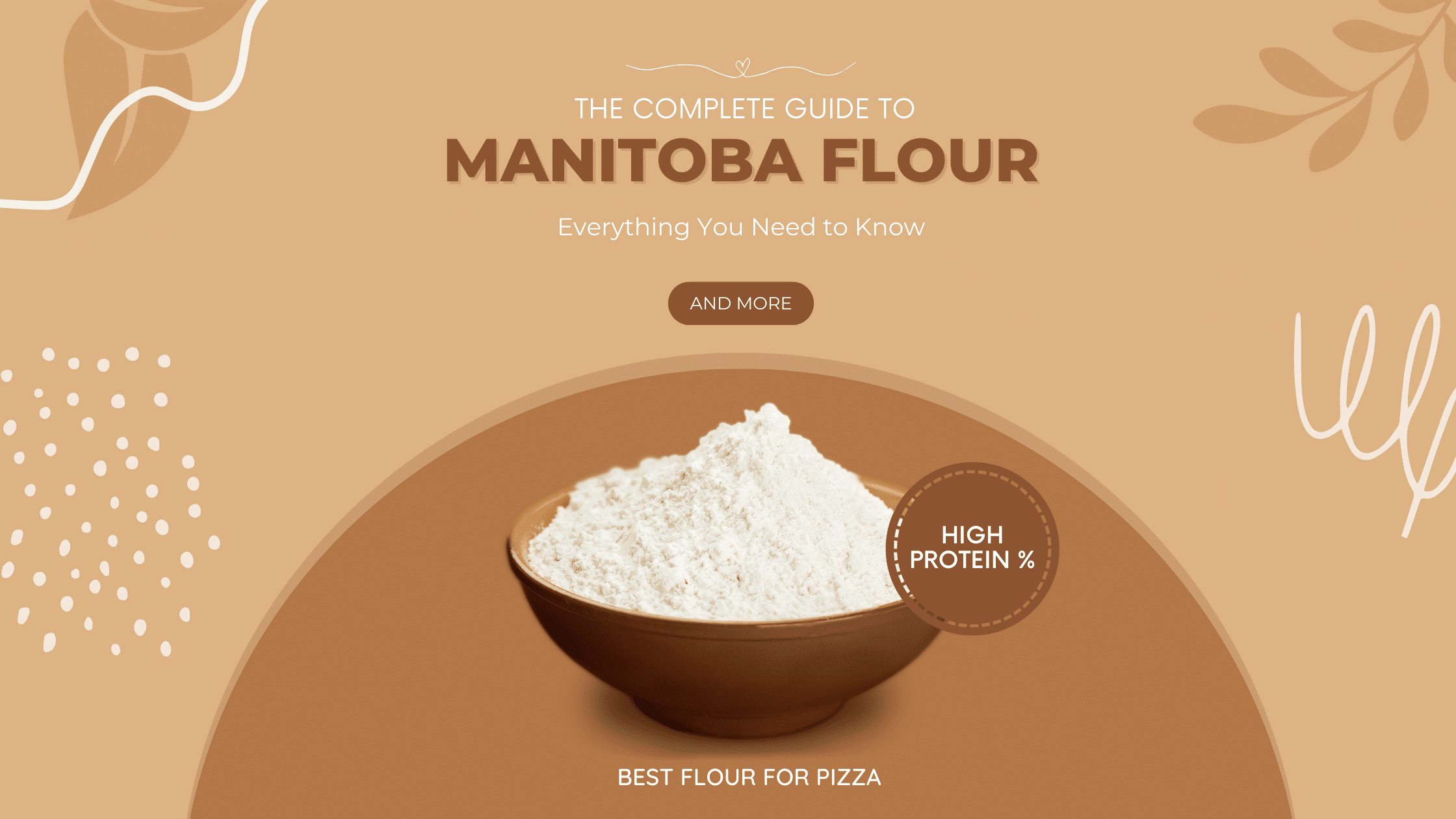
Manitoba Flour: Unlocking the Potential of the #1 High-Gluten Flour
the PROs
You might have heard about Manitoba flour and are wondering what all the fuss is about. Well, let us tell …
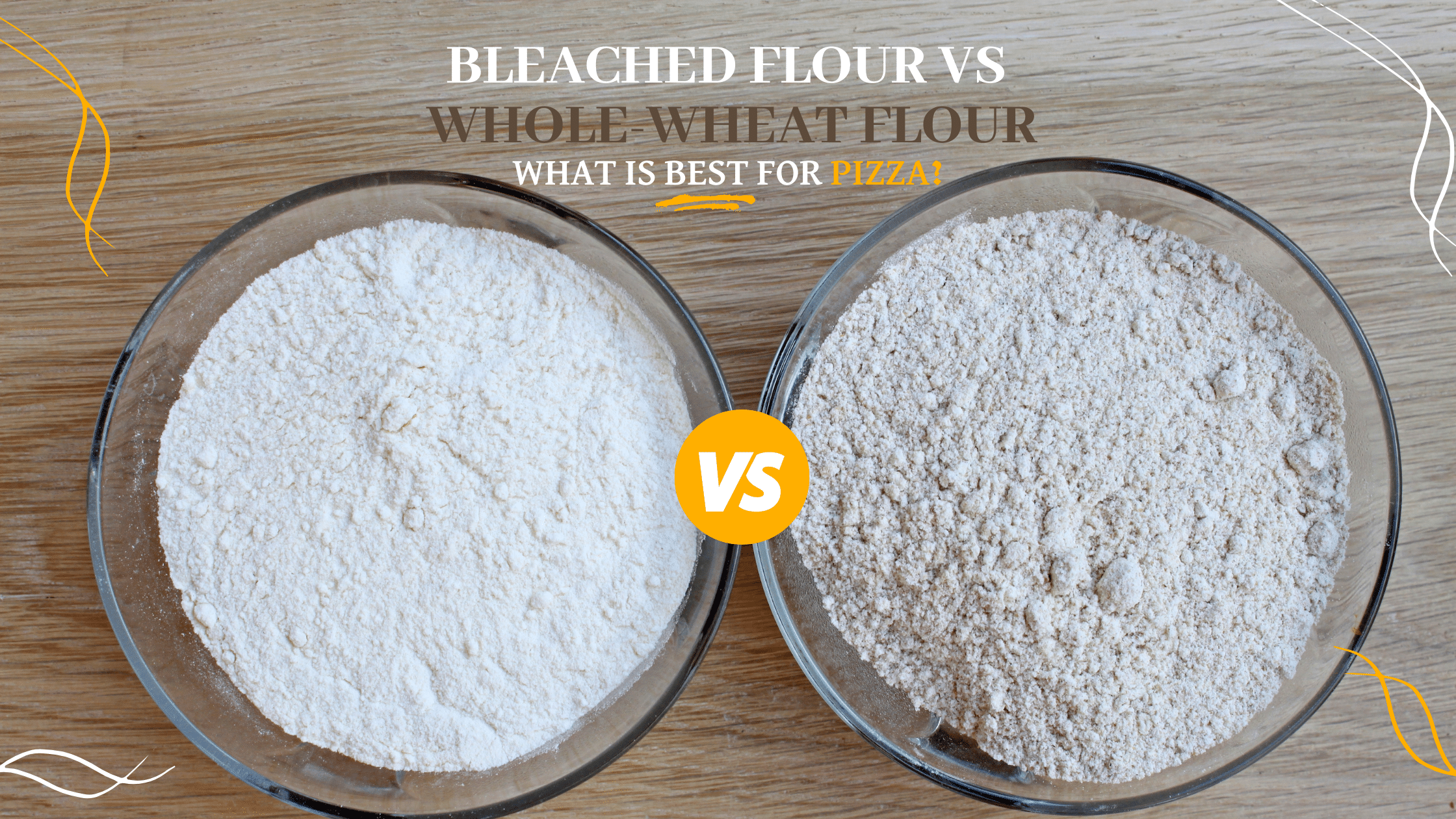
Bleached Flour vs Whole-Wheat Flour: Which is Best for Pizza?
the PROs
Bleached Flour vs. Whole-Wheat Flour The debate over bleached flour vs. whole-wheat flour for pizza is highly contended by those …
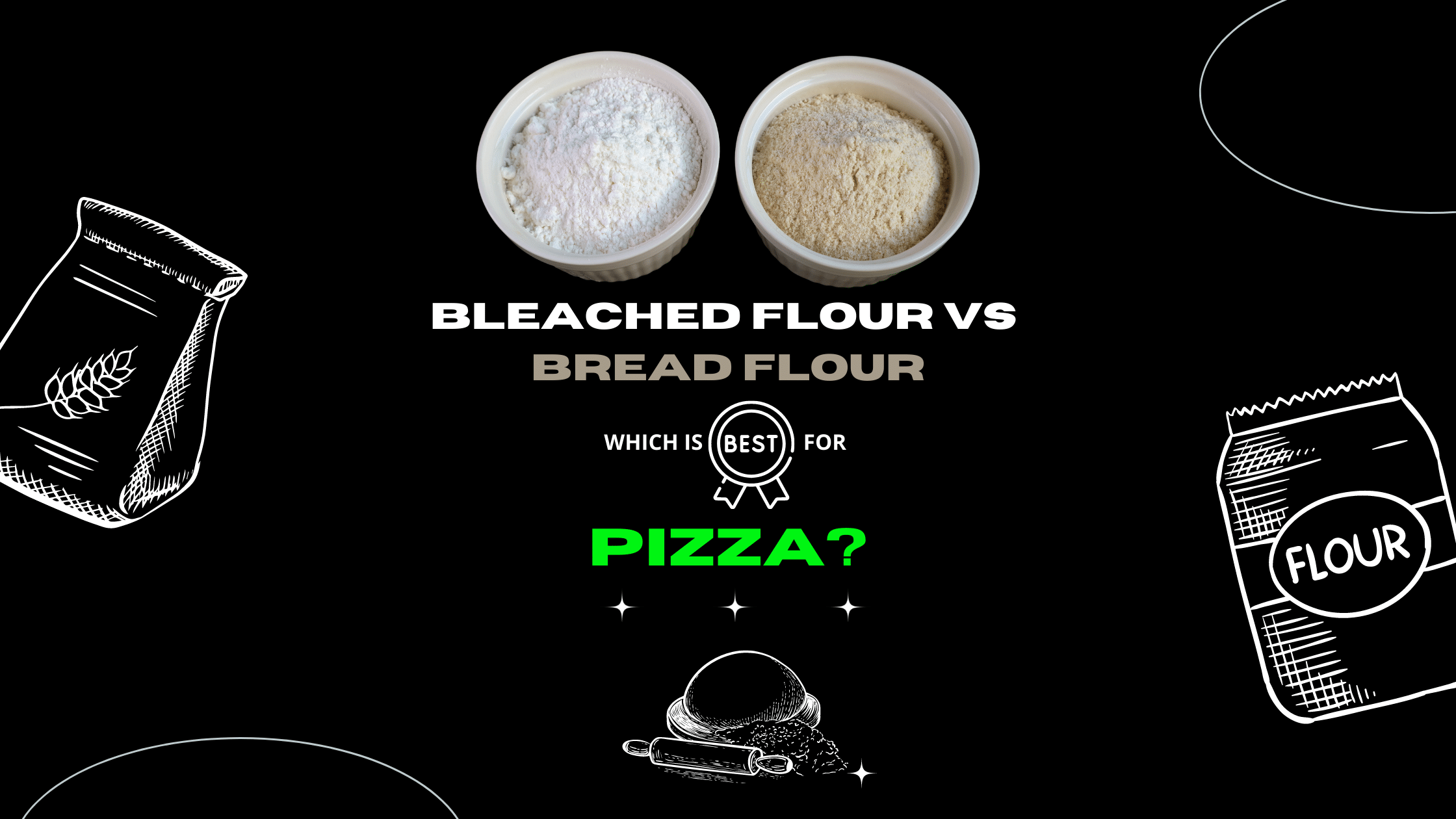
Bleached Flour vs Bread Flour: Which is Best for Pizza?
the PROs
Bleached Flour vs Bread Flour Are you interested in finding out the difference between bleached flour vs bread flour for …
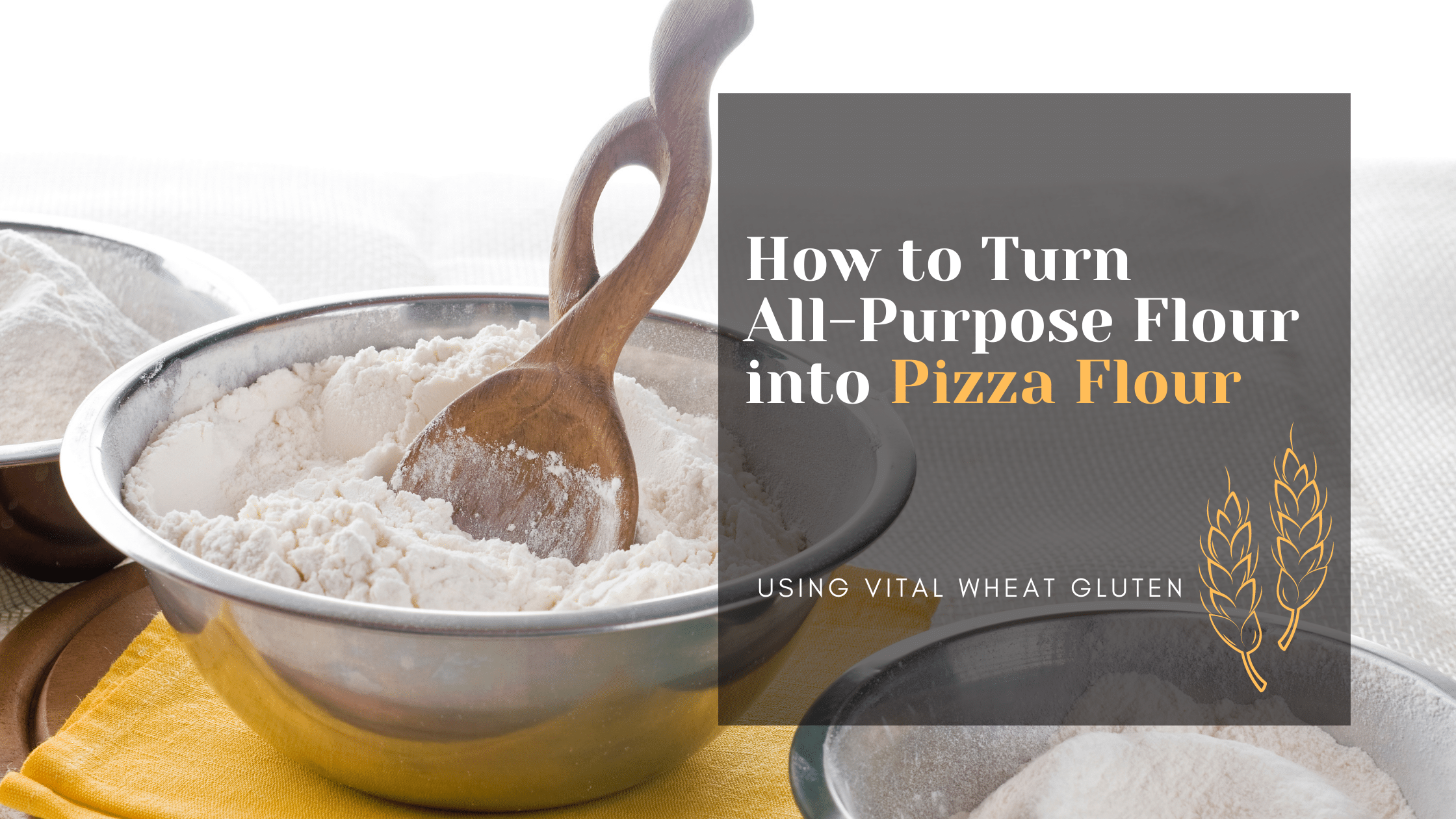
How to Instantly Turn All-Purpose Flour into Pizza Flour
the PROs
How to Turn All-Purpose Flour into Pizza Flour If you want to know how to turn all-purpose flour into pizza …
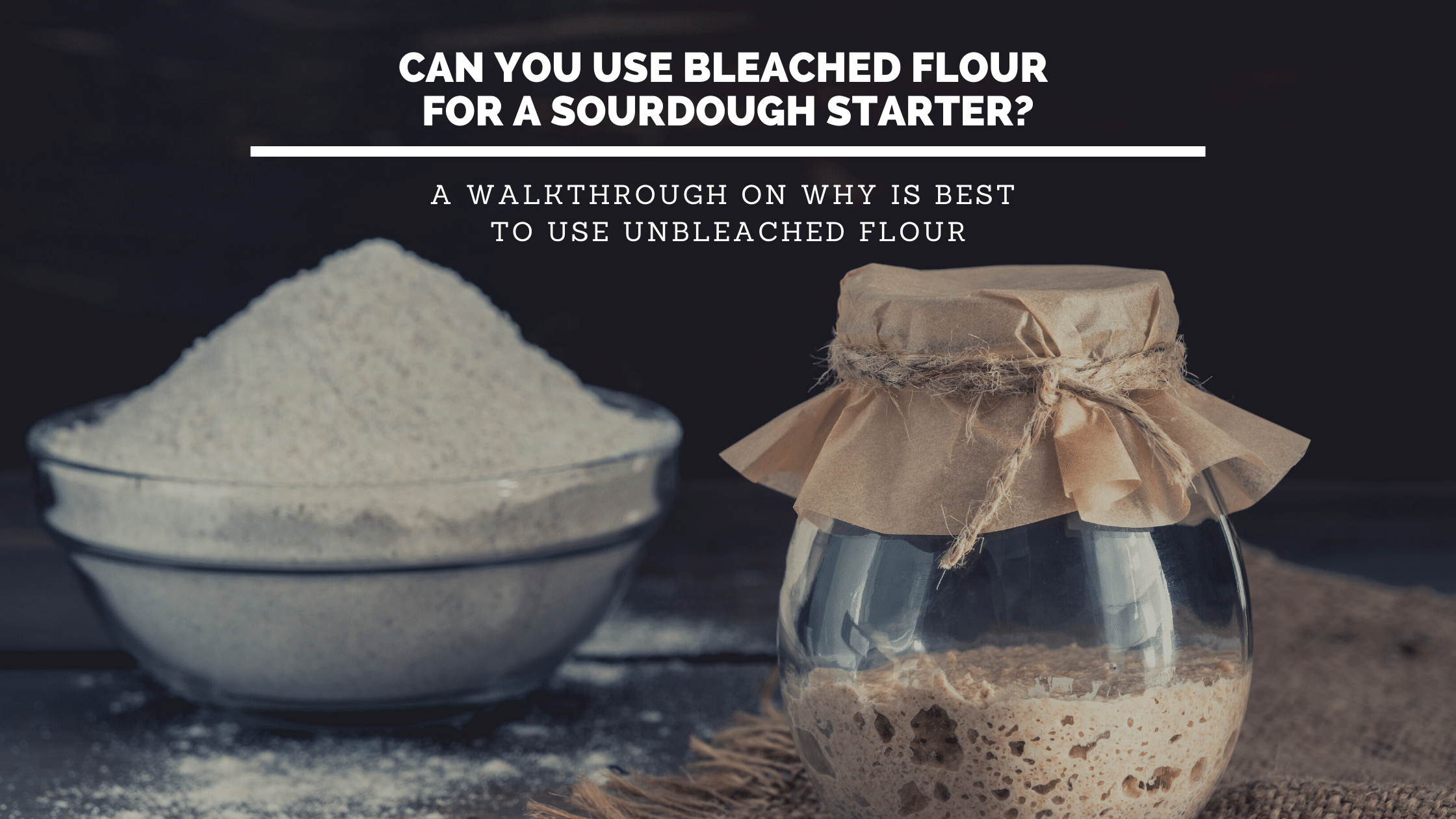
The Truth About Using Bleached Flour for Sourdough Starter
the PROs
Using Bleached Flour in Sourdough Starter? Are you wondering if you can use bleached flour for sourdough starters? Have you …
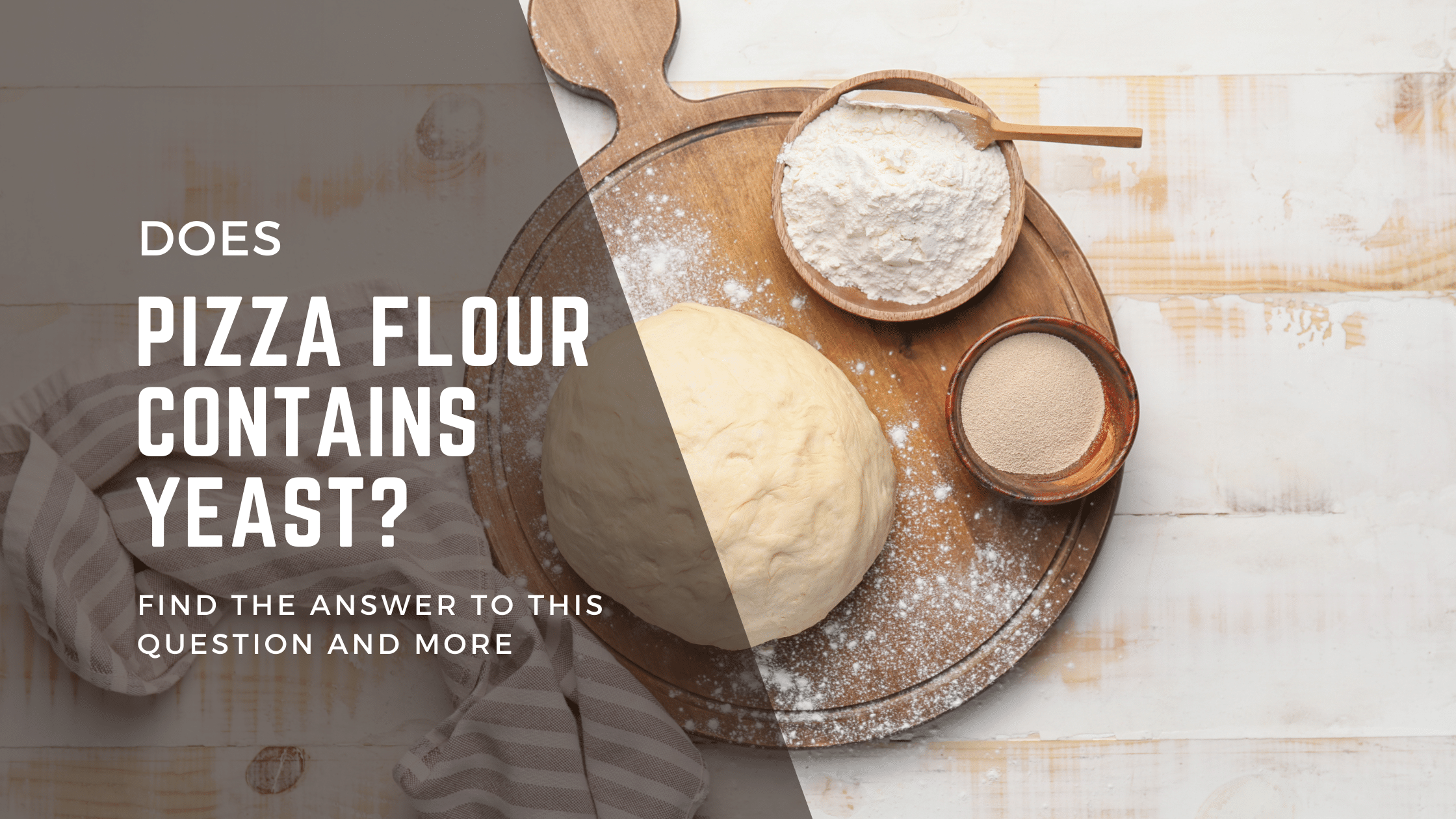
Does Pizza Flour Contain Yeast? Find What You Need to Know
the PROs
Ever wonder what gives pizza its mouth-watering, fluffy, and crisp crust? It’s all about the magic happening behind the scenes …
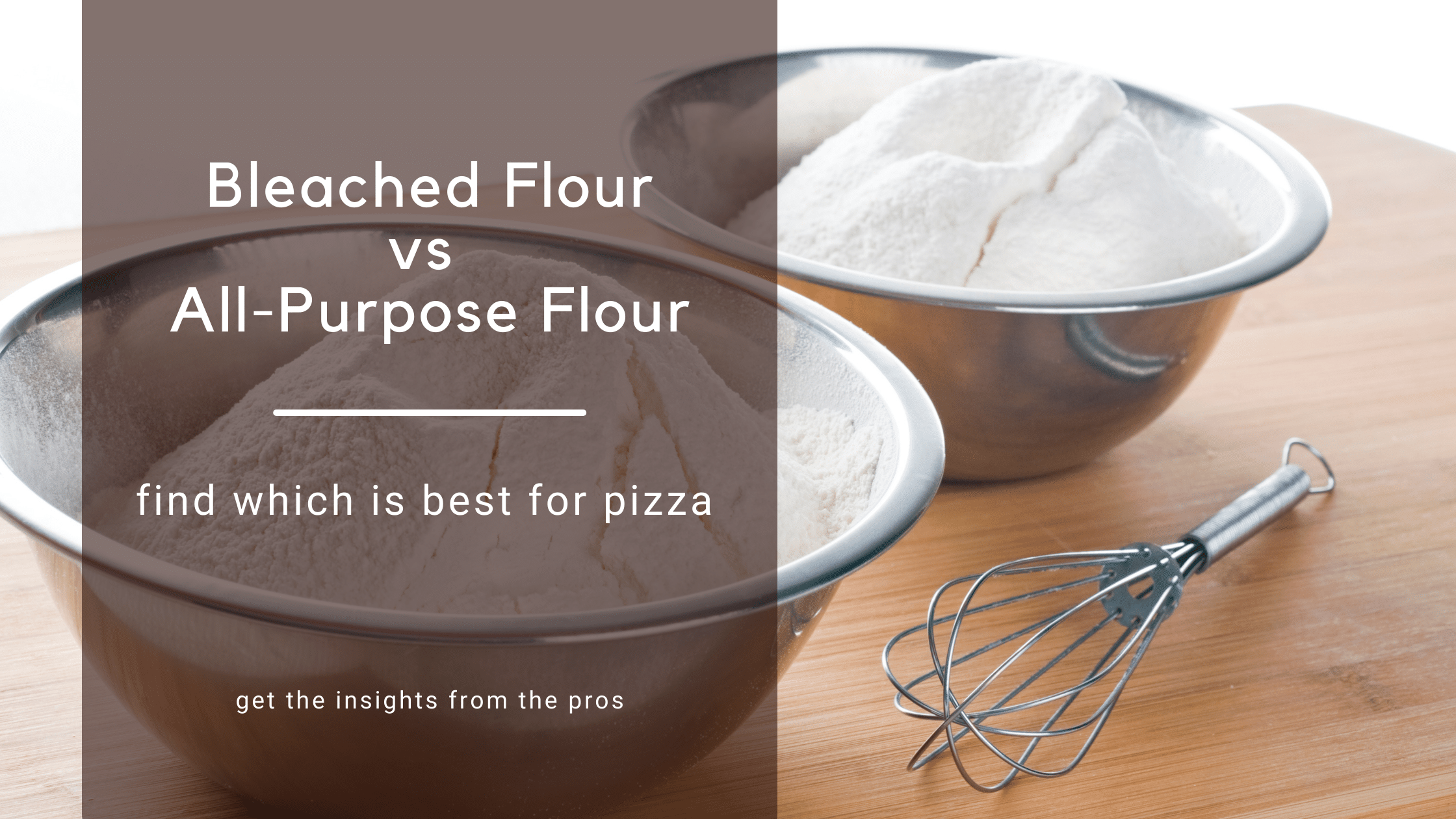
Bleached Flour vs All-Purpose Flour for Pizza (Why AP Flour is Better)
the PROs
Bleached Flour vs All-Purpose Flour for Pizza? Do you want to know which flour to pick to make your pizza …
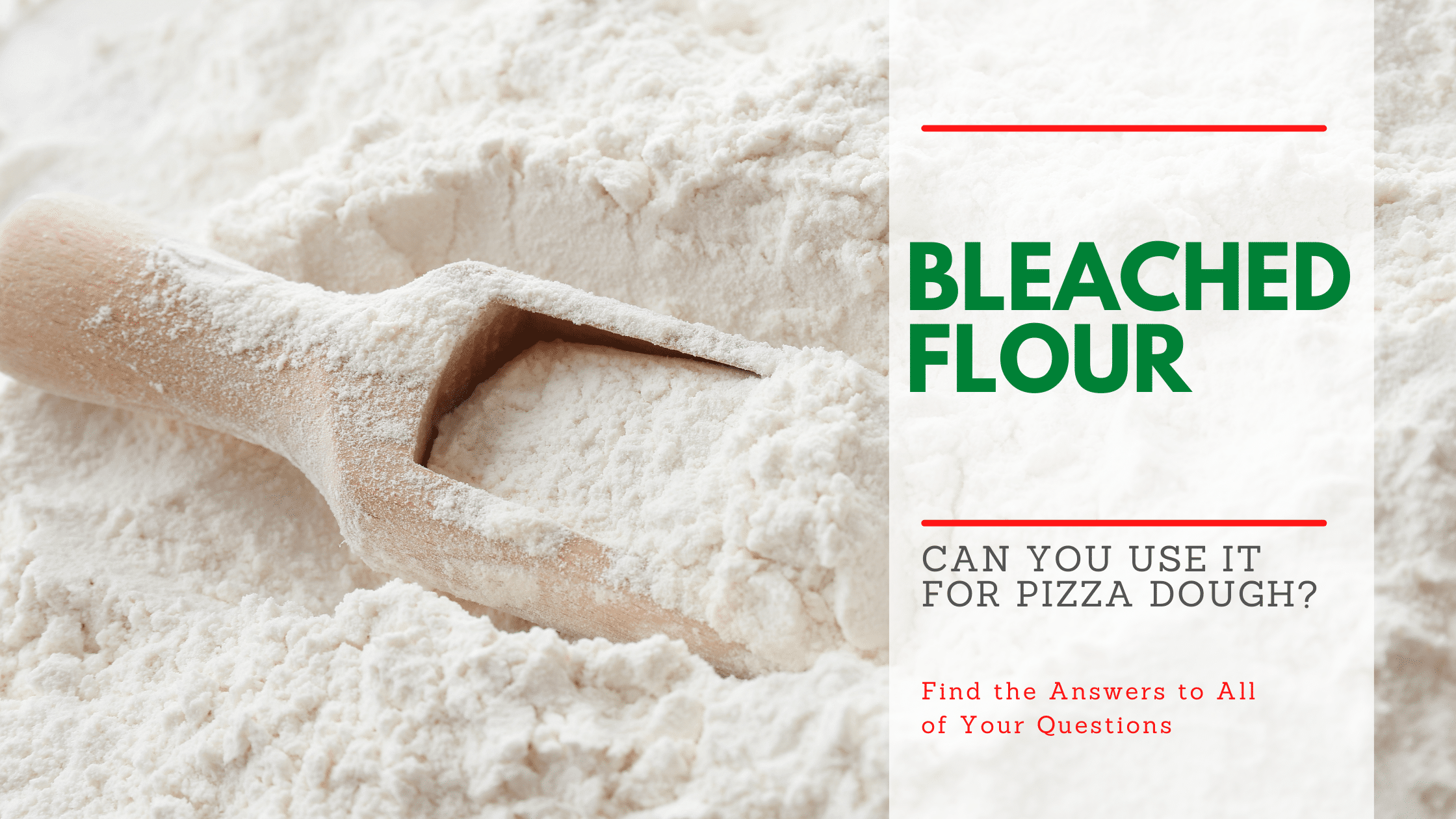
Can You Use Bleached Flour for Pizza Dough? (Why Unbleached Flour Is Better)
the PROs
Bleached or Unbleached Flour for Pizza? When it comes to crafting the ultimate pizza, choosing the right flour is crucial …
Enjoy!
Not a PRO? Not a Problem!
Take a pizza class to bring your pizza skills to the next level,
so you can be a PRO!
Related Posts

Costco Pizza Delivery: Find How You Can Get It Now!
the PROs
People go to Costco’s food court for many different reasons, but the cheesy slice of pizza they serve is among …

Pizza for Beginners: Don’t Buy Pizza, Make It! Here’s How to Get Started!
the PROs
You have this idea that you want to make pizza at home as opposed to ordering it, but where do you start? Don’t worry! Here you will find answers and directions to all your questions.

Pizza Toppings Under Cheese or Over Cheese? [Why the Order Matters]
the PROs
Is Pizza Cheese on Top or Bottom? Hey pizza lovers, are you wondering if you should layer pizza toppings under …
Newsletter
Subscribe to our Recipe of the Week newsletter and receive our partners’ latest recipes, tips, and discount offers.
Keep in Touch!
